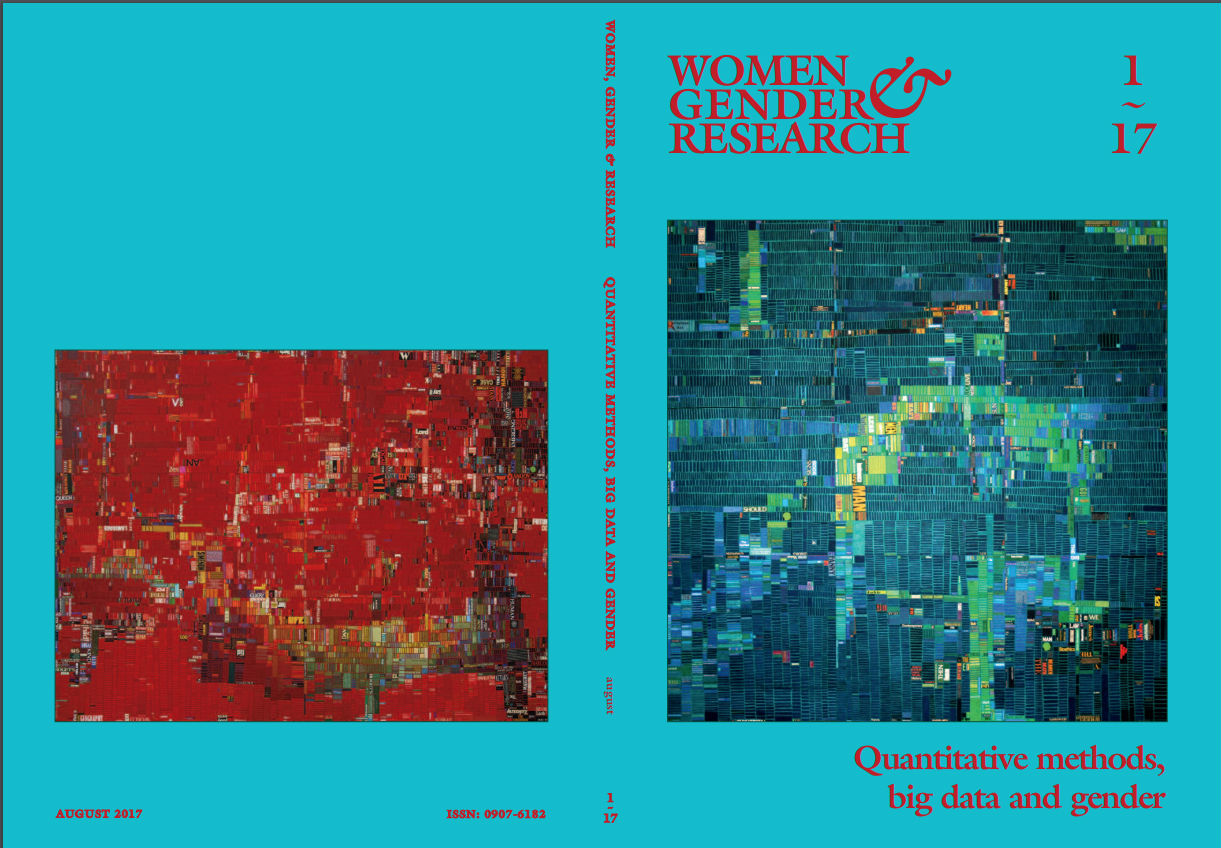Quantitative methods, big data and gender
 Kvinder, Køn og forsknings seneste nummer er netop blevet færdigt. Det er et temanummer, der som titlen afslører har særligt fokus på kvantitative metoder. Både kvantitative metoder indenfor kønsstudier og køn i kvantitative studier.
Kvinder, Køn og forsknings seneste nummer er netop blevet færdigt. Det er et temanummer, der som titlen afslører har særligt fokus på kvantitative metoder. Både kvantitative metoder indenfor kønsstudier og køn i kvantitative studier.
I introduktionen skriver Inge Henningsen, Tinne Steffensen og Hilda Rømer Christensen:
“[…] the growing hegemony of evidencebased views in neoliberal policy-making, which has turned statistics and quantitative methodologies into key data with wideranging effects at both the institutional and individual levels. As a result, knowing how to collect, find, analyze and communicate data is of increasing importance in presentdaysociety. This development has made ownership of data pivotal, along with access to IT equipment, resources and expertise. Data is, as argued by several authors of this issue, today mainly collected and stored by big corporations and governments, who have the resources to do so and who often control access.”
“What is more, this volume of Women, Gender & Research aims to explore critical aspects of power and inequality in prevailing quantitative methodologies and big data, as well as to accentuate the potentials of alternative or even subversive uses of ‘big data’ and new technologies of collection and visualization.”
“While addressing current issues, this volume also seeks to nuance or even overcome the old ‘paradigm war’ in feminist scholarship between quantitative and qualitative methodologies.”
Alle artiklerne angriber temaet fra en række forskellige vinkler. Artiklerne handler blandt andet om: et opgør med essentialistiske kvantitative metoder, komplekse intersektionelle perspektiv i kvantitative studier, geometrisk dataanalyse, familieformer og forældreskaber, en praktisk feminist tilgang til dataindsamling og -analyse, open-access-data, anti-abortion propaganda og et brugerinddragende perspektiv i dataindsamling.
Indhold (artikler):
Introduction: Quantitative Methodologies and Big Data af Inge Henningsen,Tinne Steffensen and Hilda Rømer Christensen
Reconciling Anti-Essentialism and Quantitative Methodology af Mathias Fjællegaard Jensen
Intersectionality – an intercategorical empirical approach af Ruth Emerek
Geometric Data Analysis (GDA) – an alternative approach to the analyses of gender differences af Claus D. Hansen
The roads more or less traveled: A sequence analysis of family formation and parenthood for a cohort of Danish women born in the 1970s af Tinne Steffensen
Data visualization from a feminist perspective: Interview with Catherine D’Ignazio af Nanna Thylstrup and Kristin Veel
Determinants of women’s health in Europe: using large open data collections to unveil the hidden part of the iceberg af Lourdes Cantarero-Arévalo
The political potential of numbers: data visualisation in the abortion debate af Rosemary Lucy Hill
The Development of Gender-Responsive Indicators: Towards a Participatory Approach af Michèle Amacker, Isabelle Schlaepfer, Christine Bigler and Andrea Graf
Anmeldelser af:
Gendered Entanglements: Revisiting Gender in Rapidly Changing Asia Redigeret af: Ragnhild Lund, Philippe Doneys and Bernadette P. Resurrección Anmeldt af: Henrik Hvenegaard Larsen
Cultivating Gender: Meanings of Place and Work in Rural Vietnam Skrevet af: Cecilia Bergstedt Anmeldt af: Mari Holen and Sine Lehn-Christiansen
Food and Media: Practices, Distinctions and Heterotopias Skrevet af: Jonatan Leer and Karen Klitgaard Povlsen Anmeldt af: Katherine O’Doherty Jensen
PHD NOTICES
Line Henriksen: In the Company of Ghosts – Hauntology, Ethics, Digital Monsters
Verena Lenneis: The work, life and recreational physical activity of female cleaners
KKF nr. 1, 2017: Quantitative methods, big data and gender - læs hele nummeret på hjemmesiden.
